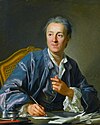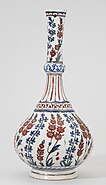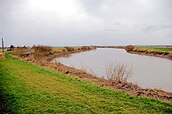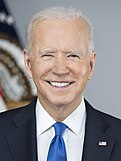User:Eloquence/Tour 01
|
First page |
The Wikipedia Main Page |

Welcome to the Wikipedia tour. My name is Denis, and I will be your guide. This trip will show you the diversity of the content on Wikipedia, some of its most unusual articles, the inner workings of the project, its policies and debates, and everything you need to know to become a contributor. Don't worry about getting lost - I will be with you during the whole trip.
What you see below is the Main Page of Wikipedia. You've probably seen it before, but pay a closer look. Much of the content below is updated daily by our open community of editors. The featured article, for example, is picked from the list of featured articles. These are pages which have undergone a community review process. The Did you know section in the lower right comes exclusively from our latest article additions. Also take a look at all the other languages Wikipedia is available in!
From today's featured article

Empire of the Sultans was a touring exhibition from 1995 to 2004 displaying objects from the Khalili Collection of Islamic Art. Around two hundred exhibits, including calligraphy, textiles, pottery (example pictured), weapons, and metalwork, illustrated the art and daily life of six centuries of the Ottoman Empire. Many of the objects had been created for the leaders of the empire, the sultans. Two of the calligraphic pieces were the work of sultans themselves. In the 1990s, the exhibition was hosted by institutions in Switzerland, the United Kingdom, and Israel, and its first catalogue was published by J. M. Rogers. The exhibits visited thirteen cities in the United States from 2000 to 2004, despite controversies in the wake of the September 11 attacks and the Iraq War. Critics described the exhibition as wide-ranging and informative. They praised it for showing beautiful art works – naming the calligraphy in particular – and for presenting a fresh view of Islam. (Full article...)
Did you know ...
- ... that Jenny Hurn (pictured) in Lincolnshire, England, is said to be haunted by a boggart that crosses the River Trent in a dish propelled by oars the size of teaspoons?
- ... that the Mount Leona Fire was finally contained on the upper slopes of Profanity Peak?
- ... that the International Olympic Committee's TikTok account praised the "incredible strategy" of speed skater Yang Jingru's win at the 2024 Winter Youth Olympics?
- ... that according to writer Russell T Davies, he conceived elements of the Doctor Who episode "Empire of Death" decades before he wrote it?
- ... that during his tenure as the manager of Austria's Burgtheater from 1971 to 1976, Gerhard Klingenberg often directed plays with analogies of a divided Europe?
- ... that Red (Taylor's Version) was credited by media publications with popularizing the "Sad Girl Autumn" phenomenon in popular culture?
- ... that 14 months after taking up track cycling, René Heyde only narrowly missed out being selected to the New Zealand team at the 1972 Summer Olympics?
- ... that during the construction of 181 Montague Street in New York City, each of the building's columns was pulled by 14 horses?
- ... that Unilever invited Britons to congregate and worship at a shrine to Marmite in 2010?
In the news
- Incumbent U.S. president Joe Biden (pictured) withdraws from the 2024 presidential election.
- In golf, Xander Schauffele wins the Open Championship.
- General secretary and former president of Vietnam Nguyễn Phú Trọng dies at the age of 80.
- The International Court of Justice finds the Israeli occupation of Palestinian territories to be a violation of international law.
On this day
July 23: Seventeenth of Tammuz (Judaism, 2024), Birthday of Haile Selassie (Rastafari)
- 1860 – The trial of the Eastbourne manslaughter, which later became an important legal precedent in the United Kingdom for discussions of corporal punishment in schools, began in Lewes.
- 1927 – Wilfred Rhodes (pictured) of England and Yorkshire became the only person to play in 1,000 first-class cricket matches.
- 1942 – The Holocaust: The gas chambers at Treblinka extermination camp began operation, killing 6,500 Jews who had been transported from the Warsaw Ghetto the day before.
- 1995 – Hale–Bopp, one of the most widely observed comets of the 20th century, was independently discovered by astronomers Alan Hale and Thomas Bopp.
- 1999 – In Tulia, Texas, 47 people were arrested for dealing cocaine; years later, 35 of the 47 were pardoned by the Governor of Texas.
- John Day (d. 1584)
- Bonaventura Peeters the Elder (b. 1614)
- Daniel Radcliffe (b. 1989)
- Hassan II of Morocco (d. 1999)
Today's featured picture

|
Censorship under the military dictatorship in Brazil consisted of restrictions on the media, artists, journalists, and others whom the government deemed "subversive", "dangerous" or "immoral". The political system of the Brazilian military dictatorship, installed by a 1964 coup d'état and which persisted until 1985, also set out to censor material that went against what it called "morality and good manners". The constitution of 1967 established censorship as an official, centralized activity of the Brazilian federal government. There were several protests against the practice, including the Cultura contra Censura protest in February 1968, depicted in this photograph, which shows the actresses Tônia Carrero, Eva Wilma, Odete Lara, Norma Bengell and Cacilda Becker. Photograph credit: unknown; restored by Adam Cuerden
Recently featured:
|
Other areas of Wikipedia
- Community portal – The central hub for editors, with resources, links, tasks, and announcements.
- Village pump – Forum for discussions about Wikipedia itself, including policies and technical issues.
- Site news – Sources of news about Wikipedia and the broader Wikimedia movement.
- Teahouse – Ask basic questions about using or editing Wikipedia.
- Help desk – Ask questions about using or editing Wikipedia.
- Reference desk – Ask research questions about encyclopedic topics.
- Content portals – A unique way to navigate the encyclopedia.
Wikipedia's sister projects
Wikipedia is written by volunteer editors and hosted by the Wikimedia Foundation, a non-profit organization that also hosts a range of other volunteer projects:
-
Commons
Free media repository -
MediaWiki
Wiki software development -
Meta-Wiki
Wikimedia project coordination -
Wikibooks
Free textbooks and manuals -
Wikidata
Free knowledge base -
Wikinews
Free-content news -
Wikiquote
Collection of quotations -
Wikisource
Free-content library -
Wikispecies
Directory of species -
Wikiversity
Free learning tools -
Wikivoyage
Free travel guide -
Wiktionary
Dictionary and thesaurus
Wikipedia languages
This Wikipedia is written in English. Many other Wikipedias are available; some of the largest are listed below.
-
1,000,000+ articles
-
250,000+ articles
-
50,000+ articles



